#Negin Khpalwak
Photo
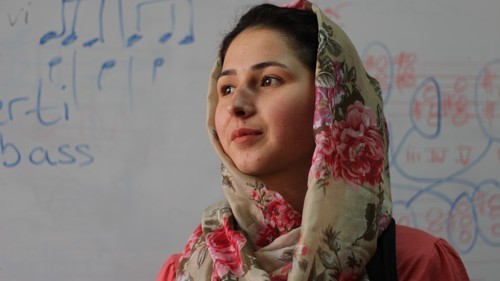
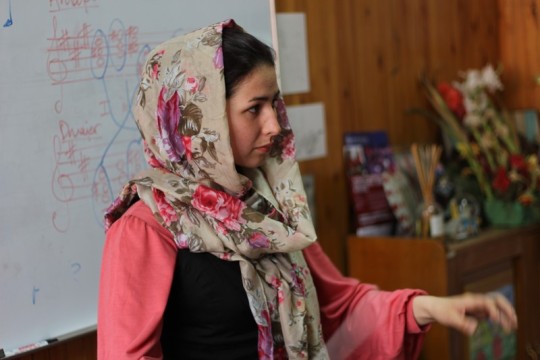
Facing Death Threats, Afghanistan’s First Female Conductor Plays On
By Maija Liuhto
16.6.17
At 12 years old, Negin Khpalwak decided she wanted to study music. Then, her uncles threatened to kill her.
Khpalwak, now 20, is from the restive Kunar province in Eastern Afghanistan. I meet her in a classroom in Kabul, where she sits behind a grand piano surrounded by young women and girls clutching violins, clarinets, and cellos. Khpalwak listens to Lauren Braithwaite, a woodwind teacher originally from the UK, as she leads a rehearsal session of Zohra, Afghanistan’s first women’s orchestra, which is a project of the Afghanistan National Institute of Music, or ANIM.
“Violins, I love you to death – but C is still not right,” Braithwaite says as the young women rehearse the section again.
Typically, Khpalwak stands in Braithwaite’s place, holding a baton in front of her classroom of women; she is the first female conductor in Afghanistan.
Last year, Khpalwak’s orchestra shot to fame after their debut international performance at the World Economic Forum in Davos, Switzerland. Like Khpalwak, many of the young women in her orchestra faced challenges just convincing their families to allow them to study and practice music—let alone travel abroad. But Braithwaite says the trip was a success. “The reception was overwhelming,” she remembers. “We had crowds of people wanting encores. They were coming right up to the stage. It was like we were a famous band.”
But all of this would have been unthinkable only 16 years ago. The Taliban, who ruled most of Afghanistan from 1996 until US invasion in 2001, strictly banned all forms of music, and women were not allowed to participate in activities outside of the home, including studying at schools or universities.
As a young girl, the thought of studying music had never crossed Khpalwak’s mind. “I had seen many female singers, but I’d never seen a woman play an instrument in Afghanistan,” she says.
Despite cultural and political shifts in Afghanistan since the end of Taliban rule, many still believe music to be against Islam—especially when it comes to female performers. When Khpalwak decided she wanted to join ANIM, she was fearful of her parents’ reaction, but it was actually her uncles who threatened her life. “[My uncles] were saying, ‘We will kill you. Wherever we see you, we will kill you,’” Khpalwak remembers. “They think girls should stay at home and that Muslims can’t play music.”
Luckily, however, Khpalwak spent the majority of her teenage years away from her uncles, as her family moved her to an orphanage in Kabul when she was nine years old so that she would be closer to opportunities for education.
The idea behind ANIM, which also provides a regular school curriculum for students, extends beyond reviving music in Afghanistan after the Taliban rule. “One of the objectives of the program is to rebuild and improve the lives of disadvantaged kids and to make a small contribution towards empowering girls and women through music and education,” explains Ahmad Sarmast, founder and director of AMIN.
When ANIM opened its doors in 2010, the majority of students came from orphanages or poor, rural families. “They come from far away provinces where there are no schools – even for boys,” says Sarmast. “That’s why many of these girls ended up in orphanages [in the capital]. Their families care for their future and education.”
“After joining ANIM, I didn’t go back home for a long time because my uncles created problems for me,” Khpalwak says. Today, she says her immediate family also lives in Kabul, due to threats from her uncles.
Braithwaite says this sort of sacrifice is not atypical for students at ANIM—and particularly the girls. “These students are sacrificing relationships, they’re going against their families, and they’re perhaps having to move away from their families to be able to do what they’re doing,” she says.
In 2014, students of ANIM were targeted by a suicide bomber while giving a performance at the French cultural center in Kabul, killing one and injuring several others. According to Sarmast, who was injured in the attack, there are still credible threats toward the institute.
But Khpalwak believes in leading by example, and she hopes one day of opening a national orchestra for Afghanistan. “If we are scared and sit at home, we can’t progress and we can’t open the door for others.”
#long post#afghanistan#women#youth#education#islam#Religion#Maija Liuhto#Negin Khpalwak#Zohra#orchestra#taliban
308 notes
·
View notes
Photo
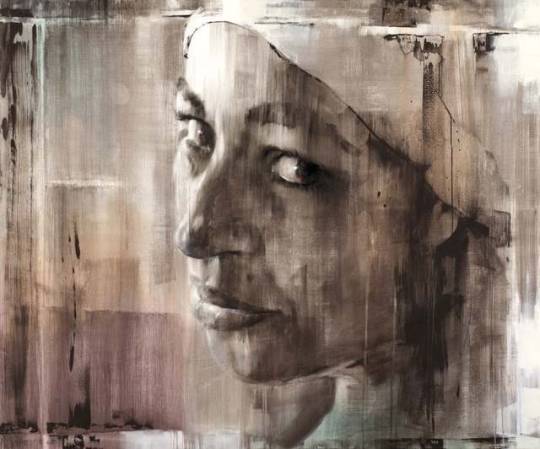
"Fearless"
9 ritratti di donne "senza paura" al PAN di Napoli
Si inaugura domani giovedì 13 alle 17.30 e sarà visitabile fino al 1 luglio, "Fearless", personale dell'artista Pier Toffoletti, per la prima volta a Napoli
L'esposizione, appositamente concepita per l'occasione, è a cura di Marina Guida ed è composta da nove ritratti di altrettante donne, tutte straordinarie e, appunto, "fearless", ossia "senza paura". L'artista udinese rende loro omaggio, riproducendole su tele di grandi dimensioni. Qualcuna delle sue "muse" è arrivata sotto i riflettori della cronaca più recente per le sue "gesta" virtuose. Qualcun altra, invece, è meno conosciuta, ma altrettanto meritevole: tutte sono accomunate dall'aver sfidato pregiudizi, superato limiti imposti e dall'aver combattuto la discriminazione sociale e l'emarginazione. Ecco quindi la nigeriana Balkissa Chaibou, che si è opposta a un matrimonio combinato all'età di 12 anni, e che oggi studia per diventare medico. Ancora, l'afgana Negin Khpalwak, prima direttrice d'orchestra in un paese in cui il regime talebano vietava di suonare qualsiasi strumento. Seguono Tess Asplund, svedese di origini africane, che nel 2016 ha marciato da sola e silenziosamente con il pugno chiuso alzato ad un raduno di estrema destra in Svezia per dire no all'intolleranza e alla violenza; la nuotatrice siriana Yusra Mardini, la quindicenne svedese Greta Thunberg, la campionessa scacchista ucraina Anna Muzychuk e altre ancora. La mostra, corredata da un catalogo edito da "Casa d'Arte San Miniato di Pisa" e promossa dall'assessorato comunale alla Cultura è realizzata in collaborazione con l'associazione culturale "C.r.a." (acronimo di Centro raccolta Arte) di San Miniato (Pisa) e la casa d'arte "San Lorenzo" di Pisa. Ingresso libero
di PAOLO DE LUCA
3 notes
·
View notes
Photo
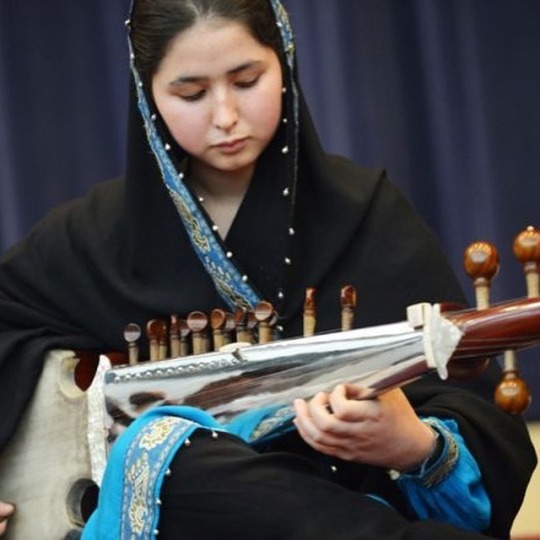
For International #DayOfTheGirl, we’re celebrating some of our favorite girls from #Afghanistan. Negin Khpalwak is a conductor leading the Zohra - the first all-girl orchestra in Afghanistan. Photo by Frishta Ghani Rubaba Mohammadi is a teenage girl drawing her dreams into reality. She was born with partial paralysis of her limbs and is unable to control her hands and feet, except for a few toes. That didn’t stop her from pursuing her passion. Photo by Saleha Sadat. The Afghan Dreamers (aka Afghan Girls Robotics Team) who recently won the 2018 Game Change of the Year award by Asia Game Changer Awards. Photo by Afghan Dreams team. Fereshta Ahmadi who created a home school for 2000 impoverished kids in #Bamyan Province. Photo by VOA Who are some of the girls that inspire you? https://www.instagram.com/p/BozA9kLhVGV/?utm_source=ig_tumblr_share&igshid=19lrf4htbnhct
4 notes
·
View notes
Photo

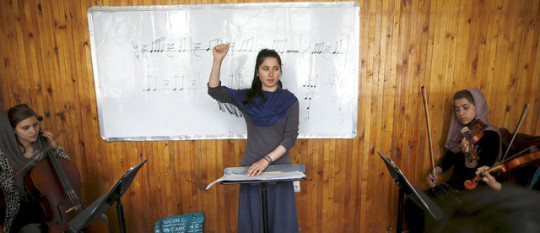

Negin Khpalwak
(1997)
Había doble limitación para Negin Khpalwak mientras crecía en Kunar, en Afganistán; ella siempre amó la música, pero siendo mujer no podía tocarla, porque estaba prohibido bajo el régimen Talibán. Y, además, es parte de la tribu Pashtun de su país, que incluso cuando lo talibanes se fueron, tampoco le permitía a mujeres o a hombres dedicarse a los instrumentos.
Así que aún siendo una niña, Negin comenzó a aprender música en secreto, con instrumentos tradicionales asiáticos como el sarod. Su padre se enteró y la apoyo, aunque todo el resto de la familia no debía saberlo; cuando lo hicieron estaban en contra. Sus tíos, de hecho, la tuvieron cautiva seis meses en su hogar, sin poder volver al colegio, porque las niñas deben estar en la casa en su cultura. Entonces, con nueve años, su padre la envió a un orfanato en Kabul, donde podía educarse y donde sí pudo por fin practicar música. Cuando Negin ha vuelto a casa de visita, recibe por esto amenazas de muerte. A los 13 años, postuló para ser parte del Instituto Nacional de Música de Afganistán, y quedó.
Negin Khpalwak se ha dedicado a organizar a otras jóvenes como ella, que se rebelan y quieren convertirse en músicas. Es la líder de la orquesta Zohra, un conjunto de 35 mujeres y parte de Instituto Nacional de Música; es la primera orquesta de su país sólo compuesta por músicas. Juntas han tocado en el encuentro del Foro Económico Mundial, en Davos, con Negin como conductora, la primera mujer en su país en hacerlo. El grupo toca una mezcla de instrumentos tradicionales asiáticos junto con occidentales.
Aunque sigue viviendo en peligro por ser músicas, para Negin, su rol es uno de dar el ejemplo. “Matan a muchas mujeres en Afganistán. Pero tenemos que luchar por nuestra libertad. Algún día tendremos más libertad, y eso vendrá al mirar a niñas valientes cambiando las cosas”, ha dicho la joven conductora. Su sueño es estudiar conducción en Italia, y volver luego a su país para organizar una orquesta de mujeres adultas.
4 notes
·
View notes
Text
Afghanistan's All-Female Orchestra Falls Silent
Afghanistan’s All-Female Orchestra Falls Silent
The group entertained audiences from the Sydney Opera House to the World Economic Forum in Davos
Negin Khpalwak was sitting at her home in Kabul when she got word that the Taliban had reached the outskirts of the capital.
The 24-year old conductor, once the face of Afghanistan’s renowned all-female orchestra, immediately began to panic.
The last time the Islamist terrorists were in power, they…
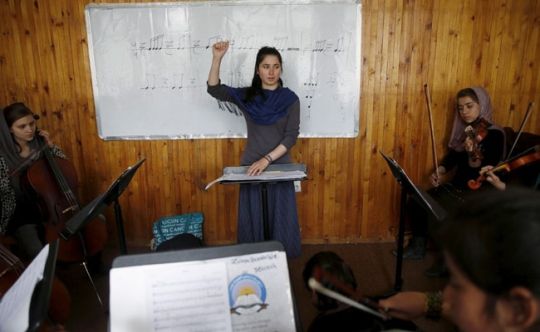
View On WordPress
0 notes
Photo
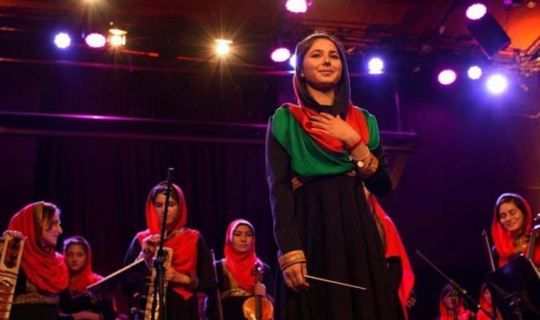
Afganistan’ın ilk kadın orkestra şefi Negin Khpalwak ülkesinden ayrıldı
0 notes
Text
Music as resistance in Afghanistan!
"The orchestra's conductor Negin Khpalwak, moved to Kabul aged 9 because there were no schools for girls in her native province of Kunar.
"Now 23, she first heard the piano when she went to audition at the music school in Kabul that Sarmast runs, falling in love with the sound of the instrument.
"'It was really like a bird is singing,' she said, smiling. 'I thought that okay, after that, I want to be a musician.'"
http://news.trust.org/item/20190315131232-lpkat/
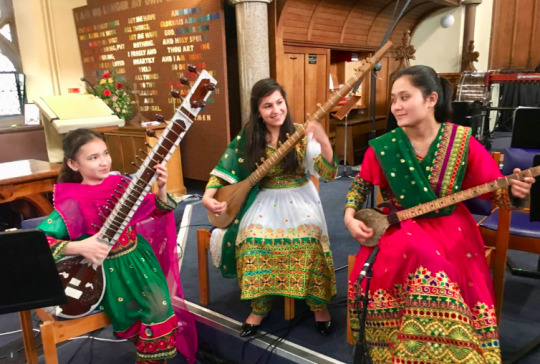
0 notes
Text
Afghanistan's first all-female orchestra Zohra visits the UK
Afghanistan’s first all-female orchestra Zohra visits the UK
[ad_1]
Image copyright
ANIM
Image caption
Zohra is led by conductor Negin Khpalwak
Five years ago, a unique all-female orchestra was formed in Afghanistan, a nation where only a few years previously music had been outlawed and women barred from education. Now Zohra is visiting the…
View On WordPress
0 notes
Text

I posted 1,507 times in 2021
514 posts created (34%)
993 posts reblogged (66%)
For every post I created, I reblogged 1.9 posts.
I added 542 tags in 2021
#mine - 110 posts
#pakistan - 84 posts
#music - 60 posts
#clothes - 57 posts
#art - 55 posts
#history - 41 posts
#national geographic - 40 posts
#food - 34 posts
#afghanistan - 33 posts
#movies - 28 posts
Longest Tag: 139 characters
#then when i taught them the reason for it - the fact that these women were being abused by their drunk husbands who were spending all thei
My Top Posts in 2021
#5

Lahore
187 notes • Posted 2021-05-03 23:46:42 GMT
#4

Karachi, 1960s
222 notes • Posted 2021-07-31 14:09:44 GMT
#3
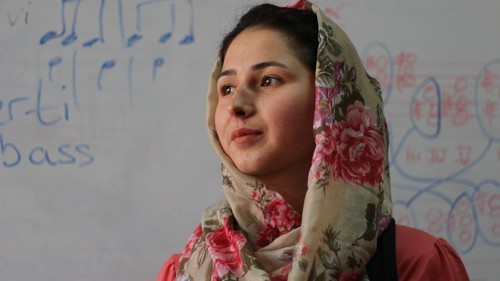
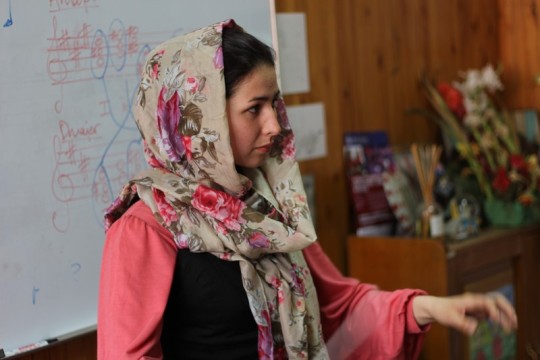
Facing Death Threats, Afghanistan’s First Female Conductor Plays On
By Maija Liuhto
16.6.17
At 12 years old, Negin Khpalwak decided she wanted to study music. Then, her uncles threatened to kill her.
Khpalwak, now 20, is from the restive Kunar province in Eastern Afghanistan. I meet her in a classroom in Kabul, where she sits behind a grand piano surrounded by young women and girls clutching violins, clarinets, and cellos. Khpalwak listens to Lauren Braithwaite, a woodwind teacher originally from the UK, as she leads a rehearsal session of Zohra, Afghanistan’s first women’s orchestra, which is a project of the Afghanistan National Institute of Music, or ANIM.
“Violins, I love you to death – but C is still not right,” Braithwaite says as the young women rehearse the section again.
Typically, Khpalwak stands in Braithwaite’s place, holding a baton in front of her classroom of women; she is the first female conductor in Afghanistan.
Last year, Khpalwak’s orchestra shot to fame after their debut international performance at the World Economic Forum in Davos, Switzerland. Like Khpalwak, many of the young women in her orchestra faced challenges just convincing their families to allow them to study and practice music—let alone travel abroad. But Braithwaite says the trip was a success. “The reception was overwhelming,” she remembers. “We had crowds of people wanting encores. They were coming right up to the stage. It was like we were a famous band.”
But all of this would have been unthinkable only 16 years ago. The Taliban, who ruled most of Afghanistan from 1996 until US invasion in 2001, strictly banned all forms of music, and women were not allowed to participate in activities outside of the home, including studying at schools or universities.
As a young girl, the thought of studying music had never crossed Khpalwak’s mind. “I had seen many female singers, but I’d never seen a woman play an instrument in Afghanistan,” she says.
Despite cultural and political shifts in Afghanistan since the end of Taliban rule, many still believe music to be against Islam—especially when it comes to female performers. When Khpalwak decided she wanted to join ANIM, she was fearful of her parents’ reaction, but it was actually her uncles who threatened her life. “[My uncles] were saying, ‘We will kill you. Wherever we see you, we will kill you,’” Khpalwak remembers. “They think girls should stay at home and that Muslims can’t play music.”
Luckily, however, Khpalwak spent the majority of her teenage years away from her uncles, as her family moved her to an orphanage in Kabul when she was nine years old so that she would be closer to opportunities for education.
The idea behind ANIM, which also provides a regular school curriculum for students, extends beyond reviving music in Afghanistan after the Taliban rule. “One of the objectives of the program is to rebuild and improve the lives of disadvantaged kids and to make a small contribution towards empowering girls and women through music and education,” explains Ahmad Sarmast, founder and director of AMIN.
When ANIM opened its doors in 2010, the majority of students came from orphanages or poor, rural families. “They come from far away provinces where there are no schools – even for boys,” says Sarmast. “That’s why many of these girls ended up in orphanages [in the capital]. Their families care for their future and education.”
“After joining ANIM, I didn’t go back home for a long time because my uncles created problems for me,” Khpalwak says. Today, she says her immediate family also lives in Kabul, due to threats from her uncles.
Braithwaite says this sort of sacrifice is not atypical for students at ANIM—and particularly the girls. “These students are sacrificing relationships, they’re going against their families, and they’re perhaps having to move away from their families to be able to do what they’re doing,” she says.
In 2014, students of ANIM were targeted by a suicide bomber while giving a performance at the French cultural center in Kabul, killing one and injuring several others. According to Sarmast, who was injured in the attack, there are still credible threats toward the institute.
But Khpalwak believes in leading by example, and she hopes one day of opening a national orchestra for Afghanistan. “If we are scared and sit at home, we can’t progress and we can’t open the door for others.”
283 notes • Posted 2021-08-17 04:02:04 GMT
#2

Kashmir, 1970s
326 notes • Posted 2021-09-09 09:35:10 GMT
#1
why is every brown and/or ex-Muslim person I find on this website a fucking terf I'm so sick of y'all
1242 notes • Posted 2021-08-03 18:19:58 GMT
Get your Tumblr 2021 Year in Review →
#my 2021 tumblr year in review#I'M SCREAMING AT MY NUMBER 1 POST#IT'S ONLY NUMBER 1 CUZ OF ALL THE TERFS LMFAOOOOO
4 notes
·
View notes
Text
Negin Khpalwak
cheffe d’orchestre née en 1998,
Février 2016 à Kaboul, 400 personnes assistent à l'Institut national afghan de musique au concert de de l'orchestre Zohra. L'orchestre est exclusivement féminin ce qui était interdit par les taliban et reste exclu par les conservateurs aujourd'hui. La musique est tabou pour les filles. Negin qui dirige l’orchestre à appris à jouer en cachette.
L’école des filles reste toujours une cible privilégiée des extrémistes.

0 notes
Text
WOW Kathmandu: A Celebration of Diversity
A lot can be said about a city from the way its people behave. My first impression of Kathmandu was, this feels like home; followed immediately by, this city is less aloof and more welcoming than home. There were no immigration officers to cross-question you, no impatient looks when you weren’t sure of your destination(s) and, no one to stare at you if you looked, acted or dressed a certain way. There were, however, people who went out of their way to assist you; there were strangers you could strike random conversations with, without any fear, and there was a festival that was the embodiment of everything that made Kathmandu a city of diversity and resilience.
WOW - Women of the World - Kathmandu is part of a larger network of Festivals at the Southbank Centre founded by Jude Kelly, and has become a global movement that celebrates women and girls. Being a co-curator of WOW Karachi, the first of the South Asian festivals organised in May 2016, I had a general sense of what to expect structurally: the panel discussions, workshops, Bites (short stories), Speed Mentoring and performances. Jude Kelly describes this framework as a row of empty buckets, with each country and organisation filling it with what defines their community.
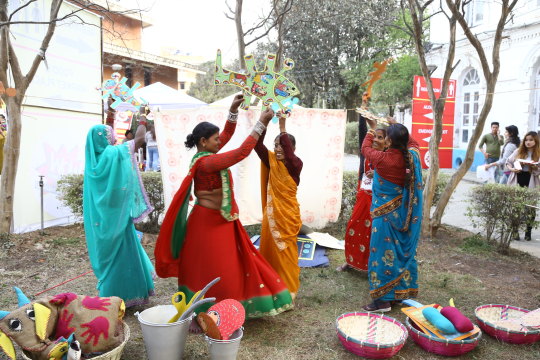
In the days leading up to the festival, a sense of excitement and camaraderie enveloped the city. I found posters and flyers displayed everywhere I went, from small cafes in obscure lanes, to large supermarkets and restaurants. I met people who were aware of what was happening: a celebration of, and for, the women and girls. In those moments the roles were reversed and I was no longer a promoter of the festival; the people of Kathmandu were, with their fierce sense of ownership and pride for their city and all that it had to offer.
This was demonstrated throughout the festival, attended by men, women and children of all ages. For that one day, there were no boundaries or barriers, and no politics of division. Instead, it was about realising the role each individual played in building the other, regardless of the gender, and coming up with ways to reach that goal. Each strand ensured there was inclusivity and representation of those whose voices are subdued: the marketplace was dotted with local, fair trade products and traditional food prepared by home-based workers; there were groups supporting women and LGBTQ rights and performances by disabled people, artists and artisans, musicians, and dancers that drew the crowd in and encouraged them to participate. The sessions were in both Nepalese and English, with brilliant translators interpreting them so neither the local nor the foreign attendees were alienated. Young girls had the opportunity to be mentored by visionaries, there were inspiring talks from women across South Asia and workshops on start-ups, body image and movement therapy.
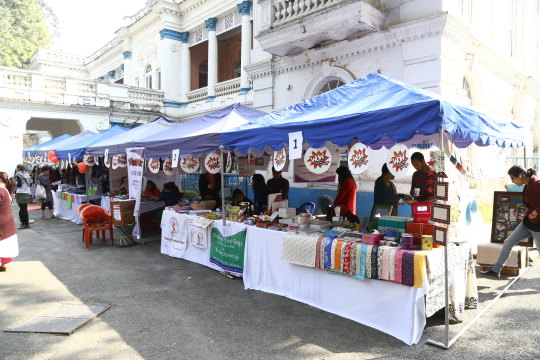
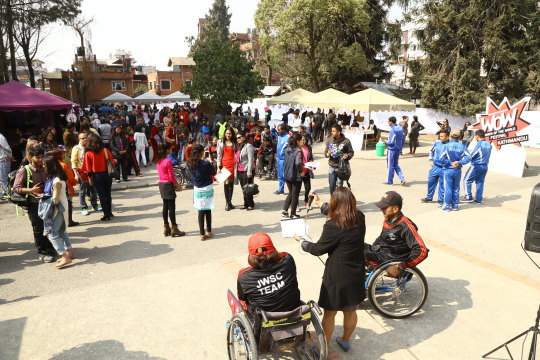
What astounded me the most was how much we could achieve, as the South Asian region, if we were to come together. There are times when it becomes hard to pick issues that matter the most in a particular community. Having voices from other regions allows for a greater depth and a platform to talk about a wider range of things. South Asia was represented by some of the most wonderful women - including Negin Khpalwak, the first female conductor from Afghanistan, Jayanthi Kuru-Utumpala, the first Sri Lankan to climb Everest, Nidhi Goyal, gender and disability rights activist from India, Ambassador Nasim Ferdous from Bangladesh and tech entrepreneur Jehan Ara from Pakistan, along with other powerhouses from Nepal - and the programme reflected that richness and diversity.
You don’t always need tangible resources to do something meaningful; you just need wholehearted belief in what you’re doing, and a group of people willing to realise that vision. WOWKTM was made possible, and magical, by the fantastic team at British Council, Nepal and a curatorial body of local organisations that worked tirelessly to ensure that everything was flawless: from training the speakers and reaching out to the communities to keeping everything holistic, accessible and inclusive.

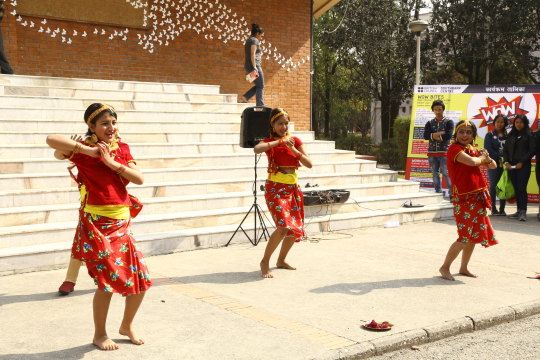
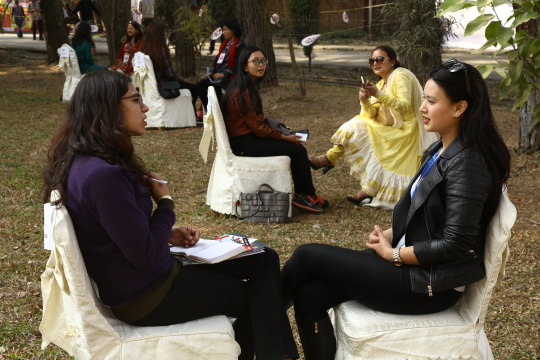
WOWKTM was a sensory delight, brimming with joie de vivre and filling everyone with love, hope and inspiration. At no point did anything feel overwhelming, the event flowing together seamlessly, almost sensuously, giving ample time to experience, take part and contemplate. It left you, or you left it with a sense of accomplishment and pride in being a woman, knowing a woman and having the power to nurture a woman.
More power to the people of WOW.
***
More information: British Council Nepal
Festival highlights: WOWKTM 2017 in Pictures
0 notes